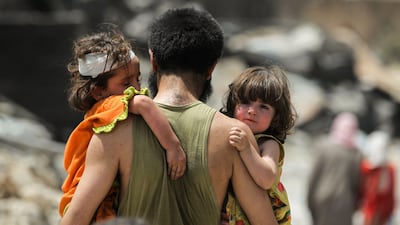BEIRUT// ISIL may be on its last legs in Mosul and down to a few hundred fighters in the Iraqi city, but the scars from living under the militants' rule still haunt the children who have witnessed the battle to defeat them.
Children from Mosul have been left so psychologically damaged that they are unable to play or smile, even after they have fled the city and its terrors, according to researchers from international charity Save the Children.
In a study released on Wednesday, the charity described the immense toll the war has taken on the mental health of Mosul’s children.
It showed children who escaped from Mosul exhibit signs of toxic stress, a condition that leaves the mind stuck in a fight or flight mode that can cause lifelong damage if left untreated.
“What was striking was how introverted and withdrawn children have become,” said Dr Marcia Brophy, Save the Children’s senior mental health adviser in the Middle East.
“They rarely even smiled. It was as though they had lost the ability to be children.”
For the study — the largest of its kind to date — researchers interviewed 65 children between the ages of 10 and 15 who had recently fled Mosul to the Hamam Al Alil refugee camp, about 30 kilometres south of Mosul.
Ninety per cent of the children interviewed had lost a loved one in the conflict to death, abduction, or separation during a chaotic escape.
The horrors the children have witnessed dominate their lives. They keep them awake at night and give them “waking nightmares” during the day.
Almost all have difficulty understanding instructions, displaying "robotic" behaviour, the study showed.
Even though they are now safely away from the front lines and ISIL is in its death throes in Iraq, some children continue to fear attacks by the extremists.
“Since I came to the camp I don’t feel safe, because I don’t believe we are here,” said one teenage Mosul girl interviewed. “And I don’t think we are far from ISIL.”
Some have seen loved ones brutally killed under ISIL’s oppressive rule.
“My cousin was offered a cigarette by ISIL and when he accepted, they gave it to him and then killed him by gunshot on the back,” said a boy aged between 10 and 12.
ISIL captured Mosul — Iraq’s second-largest city at the time — in a lightning assault in June 2014.
Weeks later, the group's leader Abu Bakr Al Baghdadi formally declared the establishment of the so-called caliphate from the city's ancient Al Nuri mosque which was blown up by the militants in June as Iraqi forces closed in on them.
For three years, the extremists ruled the city with an iron fist, publicly executing residents for minor infractions while enforcing their puritanical codes.
School curricula were dictated by the militants’ ideology and some children were forcibly recruited into ISIL’s cadres, even occasionally appearing as executioners in propaganda videos. Even for a child, it was impossible to be isolated from the brutality of life in the self-proclaimed caliphate.
And while ISIL’s reign over the city has ended in all but a few streets, the battle to push the extremists from the city — which began late last year — has been long and bloody.
“Children escaping Mosul have gone through horror piled upon horror. They have been starved and abused inside the city. Explosive weapons have been dropped in narrow streets by all sides with little regard to their impact,” said Ana Loscin, Save the Children’s country director in Iraq. “But the impact on children is clear: even if they made it out alive they have been left scarred and broken. And right now, that’s what Mosul’s future looks like.”
While psychological support for children and adults who have survived ISIL rule is critical to avert potential long-term health problems, Save the Children says there is not enough aid. Only two per cent of the funds needed for these essential programmes in 2017 has been raised so far.
“Life-saving aid like shelter, food and water are crucial in this crisis — but to help children recover and rebuild after their ordeals, psychological support must be considered a priority,” said Ms Loscin. “The world must do more to repair the damage.”
Dr Brophy added, "These children are not going to heal in weeks or even months. They'll need support for years to come."

